六年级下册重点单词及句子
六年级下册英语第六单元
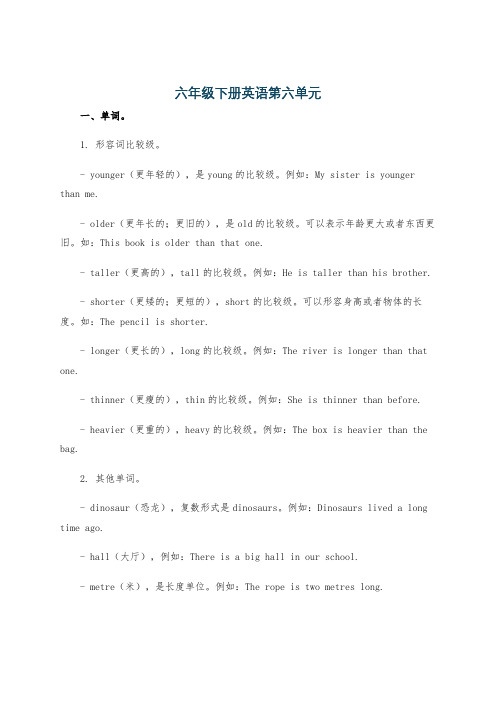
六年级下册英语第六单元一、单词。
1. 形容词比较级。
- younger(更年轻的),是young的比较级。
例如:My sister is younger than me.- older(更年长的;更旧的),是old的比较级。
可以表示年龄更大或者东西更旧。
如:This book is older than that one.- taller(更高的),tall的比较级。
例如:He is taller than his brother.- shorter(更矮的;更短的),short的比较级。
可以形容身高或者物体的长度。
如:The pencil is shorter.- longer(更长的),long的比较级。
例如:The river is longer than that one.- thinner(更瘦的),thin的比较级。
例如:She is thinner than before.- heavier(更重的),heavy的比较级。
例如:The box is heavier than the bag.2. 其他单词。
- dinosaur(恐龙),复数形式是dinosaurs。
例如:Dinosaurs lived a long time ago.- hall(大厅),例如:There is a big hall in our school.- metre(米),是长度单位。
例如:The rope is two metres long.- than(比),用于比较级句子中,连接比较的对象。
例如:I'm taller than you.二、重点句型。
1. 比较级句型。
- A + be动词 + 比较级+ than + B.- 例如:My father is stronger than my mother.(我的爸爸比我的妈妈强壮。
)- Tom's hair is shorter than John's.(汤姆的头发比约翰的短。
六年级英语下册重点词组、句子

六年级下册英语重点词组和句子Lesson 51、砍倒cut down2、净化空气make the air clean3、从植物中获取食物get food from plants4、通过空气、水和阳光制造食物make food from air , water and sunlight5、防止水分流失keep the water from flowing away6、阻止风刮起沙土stop the wind from blowing up sand and earth7、在一些地方in some places8、他们将会尽最大努力保护树木。
They will do their best to protect trees .9、我们的国家将会更美丽。
Our country will be more beautiful .10、引起洪灾和沙尘暴bring about floods and sandstorms11、明天几号?What’s the date tomorrow ?= What’s tomorrow’s date ?3月12号. It’s March 12th .12、你们在植树节干什么?What do you do on Tree Planting Day ?我们种树。
We plant trees .13、你们在哪里种树?Where will you plant trees ?在我们学校后面的小山上。
On the hills behind our school . 14、你愿意加入我们吗?Would you like to join us ?是的,我愿意。
Yes , I’d like to .15、我们几点出发?What time will we go ? 在8点。
At eight .16、植物对人们很重要。
Plants are very important to people .17、少了植物,生命将无法延续。
小学英语六年级下册句子及词语

【导语】假如⽣活是⼀条河流,愿你是⼀叶执著向前的⼩⾈;假如⽣活是⼀叶⼩⾈,愿你是个风⾬⽆阻的⽔⼿。
以下是®⽆忧考⽹为⼤家整理的《⼩学英语六年级下册句⼦及词语》供您查阅。
Unit1 How tall are you?⼀、重点单词:tall—taller更⾼的、short—shorter 更矮的、 strong—strong更强壮的、old—older年龄更⼤的、young—younger 更年轻的、big—bigger更⼤的heavy—heavier 更重的、 long—longer 更长的、 thin—thinne更瘦的、small—smaller 更⼩的、low—lower更低的、smart—smarter更聪明的dinosaur恐龙、 hall⼤厅、meter ⽶、than⽐、 both 两个都、 kilogram千克,公⽄、 countryside乡村、shadow阴影,影⼦、 become开始变得,变成⼆、重点句式:1、That's the tallest dinosaur in this hall.那是这个厅⾥的恐龙。
2、You're older than me. 你⽐我⼤。
3、How tall are you ?你有多⾼? I'm 1.65 metres.我⾝⾼1.65⽶。
4、What size are your shoes ?你穿多⼤号的鞋?5、My shoes are size 37. 我穿37号的鞋。
6 、Your feet are bigger than mine .你的脚⽐我的⼤。
7、How heavy are you ?你有多重? I'm 48 kilograms .我体重48公⽄。
8、It's taller than both of us together .它⽐我们俩加在⼀起还⾼。
三、知识点:1、形容词变为⽐较级的变化规则:(1)⼀般情况下,在形容词的词尾直接加er。
六年级下册四会单词句子

六年级下册四会单词句子Unit 1:(比较级)younger更年轻的older更老的taller更高的shorter更矮的longer 长的thinner更瘦的heavier 更重的bigger更大的smaller更小的stronger 更强壮的句子:1.That’s the tall dinosaur in this hall.那是这个厅里最高的恐龙。
2.It’s taller than both of us together.它比我俩加起来还高。
3.--How tall are you ?你有多高?—I’m 1.65 metres.我身高1.65米。
4.What size are your shoes, Mike ?迈克,你穿多大码的鞋?5.Your feet are bigger than mine. 你的脚比我的大。
My shoes are size 37.我穿37码的鞋。
6.--How heavy are you ?你多重?—I’m 48 kilograms.我体重48公斤。
Unit 2:(过去式)cleaned 打扫stayed 停留,待washed洗watched 看had 患病,得病had a cold感冒slept睡觉read 读saw 看见last最近的,上一个的yesterday 昨天before 在···之前句子:1.--How was your weekend?你周末过的怎摸样?--It was good ,thank you.很好,谢谢。
2.--What did you do?你(周末)干甚么了?--I stayed at home with your grandma. We drank tea in theafternoon and watch TV. 我和你奶奶待在家里。
我们喝了下午茶,还看了电视。
3.Did you do anything else?你还做了其它甚么事吗?Yes, I cleaned my room and washed my clothes.是的,我打扫了房间,还洗了衣服。
六年级下册英语重点单词句子

六年级下册英语重点单词句子一、重点单词。
1. younger [ˈjʌŋɡə(r)] 形容词(adj.),比较级形式,意为“更年轻的;更幼小的”。
2. older [ˈəʊldə(r)] 形容词(adj.),比较级形式,意为“更年长的;更旧的”。
3. taller [ˈtɔːlə(r)] 形容词(adj.),比较级形式,意为“更高的”。
4. shorter [ˈʃɔːtə(r)] 形容词(adj.),比较级形式,意为“更短的;更矮的”。
5. longer [ˈlɒŋɡə(r)] 形容词(adj.),比较级形式,意为“更长的”。
6. thinner [ˈθɪnə(r)] 形容词(adj.),比较级形式,意为“更瘦的”。
7. heavier [ˈheviə(r)] 形容词(adj.),比较级形式,意为“更重的”。
8. bigger [ˈbɪɡə(r)] 形容词(adj.),比较级形式,意为“更大的”。
9. smaller [ˈsmɔːlə(r)] 形容词(adj.),比较级形式,意为“更小的”。
10. stronger [ˈstrɒŋɡə(r)] 形容词(adj.),比较级形式,意为“更强壮的”。
11. yesterday [ˈjestədeɪ] 名词(n.),意为“昨天”。
12. last [lɑːst] 形容词(adj.),意为“上一个的;刚过去的”;也可作动词(v.),意为“持续”。
13. before [bɪˈfɔː(r)] 介词(prep.)/副词(adv.),意为“在……之前”。
14. hotel [həʊˈtel] 名词(n.),意为“旅馆”。
15. fixed [fɪkst] 动词(v.),fix的过去式,意为“修理;固定”。
16. broken [ˈbrəʊkən] 形容词(adj.),意为“破损的;弄坏了的”。
17. lamp [læmp] 名词(n.),意为“台灯”。
六年级下册第二单元重点句子

六年级下册第二单元重点句子1.“人非生而知之者,孰能无惑?”这句话告诉我们,每个人在学习过程中都会遇到困惑和疑问,只有经过思考和探究,才能解决这些问题,获得真知。
2.“一鼓作气,再而衰,三而竭。
”这句话告诉我们,在学习或做事时,要抓住时机,一气呵成,否则就会失去动力和信心,导致失败。
3.“甘瓜苦蒂,天下无全美也。
”这句话告诉我们,任何事物都有其优点和缺点,没有完美无缺的存在。
我们应该学会欣赏事物的美好之处,同时也要接受其不足之处。
4.种树者必培其根,种德者必养其心。
这句话强调了修养品德的重要性,就像种树需要培育树根一样,培养品德也需要养心。
只有内心善良、正直、坚定,才能成为真正有品德的人。
5.“操千曲而后晓声,观千剑而后识器。
”这句话告诉我们,要想在某个领域有所成就,必须经过长期的实践和学习,积累经验和技能,才能最终掌握其精髓。
6.“正直是道德之本。
”这句话强调了正直的重要性,它是道德品质的基石。
只有拥有正直的品德,才能赢得他人的尊重和信任。
7.“诚信是一项财宝,不应该随意虚掷。
”这句话告诉我们,诚信是一种非常宝贵的品质,它代表着一个人的信誉和可靠性。
我们应该时刻保持诚信,不要因为一时的利益而失去它。
8.“轻诺必寡信。
”这句话告诉我们,不要轻易地做出承诺,因为一旦承诺了却无法兑现,就会失去别人的信任和尊重。
我们应该谨慎地考虑自己的能力和实际情况,再做出承诺。
9.“小信成则大信立。
”这句话告诉我们,小小的诚信能够积累成为大的信誉,只有不断地保持诚信,才能赢得别人的信任和尊重。
10.“有所期诺,纤毫必偿;有所期约,时刻不易。
”这句话强调了信守承诺的重要性,无论承诺的事情大小,都应该尽力兑现。
同时,也要遵守约定的时间,不要轻易改变计划。
11.“善学者,假人之长以补其短。
”这句话告诉我们,善于学习的人应该善于借鉴别人的长处来弥补自己的短处,这样才能不断进步。
12.“默而识之,学而不厌,诲人不倦。
”这句话告诉我们,学习要有耐心和恒心,要不断积累知识和经验,同时也要乐于传授知识和经验给别人。
六年级英语下册课文重点句子短语
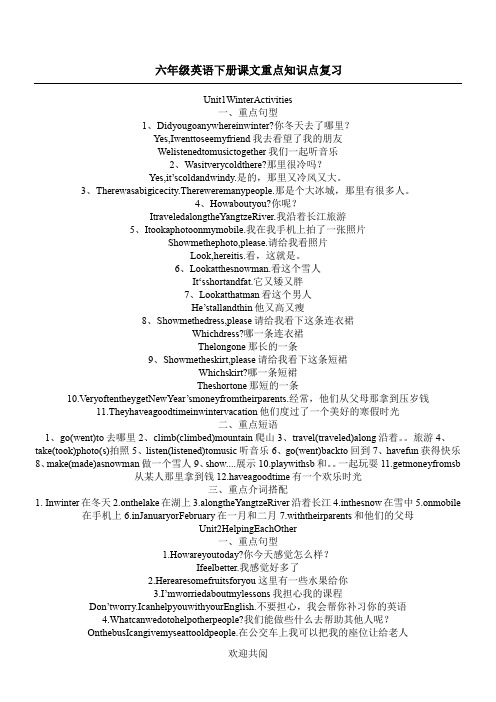
六年级英语下册课文重点知识点复习Unit1WinterActivities一、重点句型1、Didyougoanywhereinwinter?你冬天去了哪里?Yes,Iwenttoseemyfriend我去看望了我的朋友Welistenedtomusictogether我们一起听音乐2、Wasitverycoldthere?那里很冷吗?Yes,it’scoldandwindy.是的,那里又冷风又大。
3、Therewasabigicecity.Thereweremanypeople.那是个大冰城,那里有很多人。
4、Howaboutyou?你呢?ItraveledalongtheYangtzeRiver.我沿着长江旅游5、Itookaphotoonmymobile.我在我手机上拍了一张照片Showmethephoto,please.请给我看照片Look,hereitis.看,这就是。
6、Lookatthesnowman.看这个雪人It‘sshortandfat.它又矮又胖7、Lookatthatman看这个男人He’stallandthin他又高又瘦8、Showmethedress,please请给我看下这条连衣裙Whichdress?哪一条连衣裙Thelongone那长的一条9、Showmetheskirt,please请给我看下这条短裙Whichskirt?哪一条短裙Theshortone那短的一条10.VeryoftentheygetNewYear’smoneyfromtheirparents.经常,他们从父母那拿到压岁钱11.Theyhaveagoodtimeinwintervacation他们度过了一个美好的寒假时光二、重点短语1、go(went)to去哪里2、climb(climbed)mountain爬山3、travel(traveled)along沿着。
旅游4、take(took)photo(s)拍照5、listen(listened)tomusic听音乐6、go(went)backto回到7、havefun获得快乐8、make(made)asnowman做一个雪人9、show....展示10.playwithsb和。
人教版六年级英语下册各单元必背词汇和句型
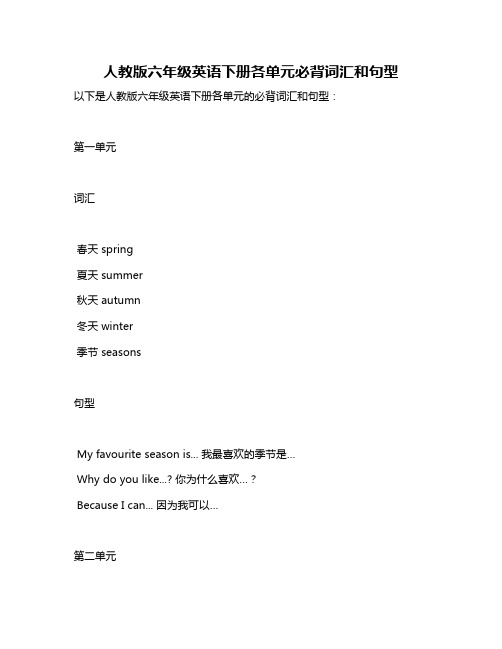
人教版六年级英语下册各单元必背词汇和句型以下是人教版六年级英语下册各单元的必背词汇和句型:第一单元词汇春天 spring夏天 summer秋天 autumn冬天 winter季节 seasons句型My favourite season is... 我最喜欢的季节是…Why do you like...? 你为什么喜欢…?Because I can... 因为我可以…第二单元词汇游泳 swim滑冰 skate放风筝 fly a kite堆雪人 make a snowman季节活动 seasonal activities句型What do you do in the...? 你在…做什么?I usually... 我通常…Do you often...? 你经常…吗?Yes, I do. / No, I don’t. 是的,我经常。
/ 不,我不经常。
第三单元词汇星期一 Monday星期二 Tuesday星期三 Wednesday星期四 Thursday星期五 Friday星期六 Saturday星期日 Sunday星期 weekdays星期天 weekends句型What do you have on...? 你星期几有什么课?I have... 我星期几有…课。
When do you have...? 你什么时候有…课? I have... on... 我在星期几有…课。
第四单元词汇电影 movies公园 parks图书馆 libraries博物馆 museums商店 shops饭店 restaurants医院 hospitals学校 schools银行 banks邮局 post offices公共场所 public places 句型。
深圳2023六年级下册英语重点知识 Unit Unit 9 Reusing things重点知识

Unit 9 Reusing things 一、单词、短语
二、核心句子
三、语音知识:
学习英语句子中的重读词。
我们在朗读英语或用英语交谈时,并不是把句子中每个词都读得一样响亮。
有些读得轻快,有些词读得重且清晰,那些读得较重且清晰的词就是句子中的重读词。
一般来说,在句子中需要重读的词都是实词,如名词、动词、形容词、数词和疑问词等。
虚词不需要重读,如冠词、连词、介词、助动词等。
四、范文:
Better city, better life
We live in Shenzhen. Shenzhen is a beautiful city.
We can make it better. Then we will have better life.
What should we do? We should keep it clean. We should throw rubbish into the bin. We should help each other. We should give our seats to old people. We should reuse things too. We should talk gently in the public.
I hope our city and life will be better and better. (72 words)。
六年级下册英语单词表和句子表
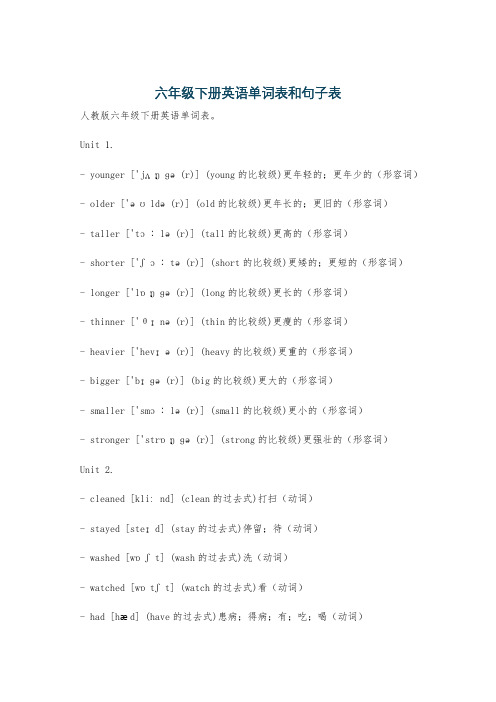
六年级下册英语单词表和句子表人教版六年级下册英语单词表。
Unit 1.- younger ['jʌŋɡə(r)] (young的比较级)更年轻的;更年少的(形容词)- older ['əʊldə(r)] (old的比较级)更年长的;更旧的(形容词)- taller ['tɔːlə(r)] (tall的比较级)更高的(形容词)- shorter ['ʃɔːtə(r)] (short的比较级)更矮的;更短的(形容词)- longer ['lɒŋɡə(r)] (long的比较级)更长的(形容词)- thinner ['θɪnə(r)] (thin的比较级)更瘦的(形容词)- heavier ['hevɪə(r)] (heavy的比较级)更重的(形容词)- bigger ['bɪɡə(r)] (big的比较级)更大的(形容词)- smaller ['smɔːlə(r)] (small的比较级)更小的(形容词)- stronger ['strɒŋɡə(r)] (strong的比较级)更强壮的(形容词)Unit 2.- cleaned [kliːnd] (clean的过去式)打扫(动词)- stayed [steɪd] (stay的过去式)停留;待(动词)- washed [wɒʃt] (wash的过去式)洗(动词)- watched [wɒtʃt] (watch的过去式)看(动词)- had [hæd] (have的过去式)患病;得病;有;吃;喝(动词)- had a cold感冒。
- slept [slept] (sleep的过去式)睡觉(动词)- read [red] (read的过去式)读;阅读(动词)- saw [sɔː] (see的过去式)看见(动词)- last [lɑːst] 最近的;上一个的(形容词);最后(副词)- yesterday ['jestədeɪ] 昨天(名词)- before [bɪ'fɔː(r)] 在……之前(介词、连词)Unit 3.- went [went] (go的过去式)去(动词)- camp [kæmp] 野营(动词、名词)- went camping去野营。
六年级下册英语外研版知识点
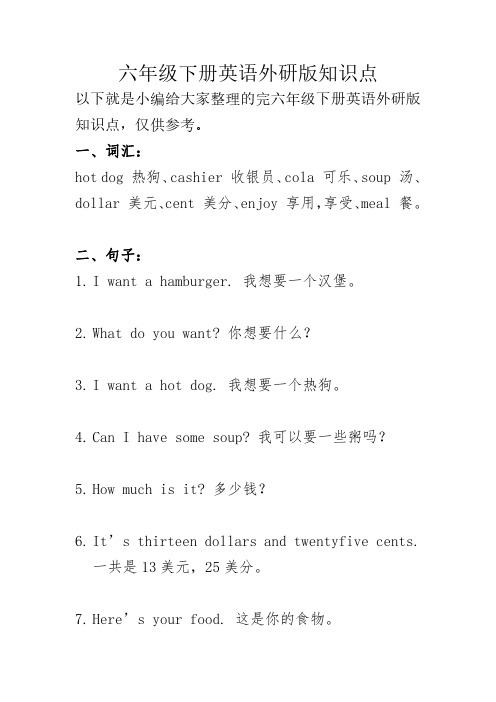
六年级下册英语外研版知识点
以下就是小编给大家整理的完六年级下册英语外研版知识点,仅供参考。
一、词汇:
hot dog热狗、cashier收银员、cola可乐、soup汤、dollar美元、cent美分、enjoy享用,享受、meal餐。
二、句子:
1.I want a hamburger.我想要一个汉堡。
2.What do you want?你想要什么?
3.I want a hot dog.我想要一个热狗。
4.Can I have some soup?我可以要一些粥吗?
5.How much is it?多少钱?
6.It’s thirteen dollars and twentyfive cents.
一共是13美元,25美分。
7.Here’s your food.这是你的食物。
8.What do you want to eat?你想吃什么?
9.I want to eat some meat.我想吃些肉。
以上就是小编给大家整理的外研版六年级下册英语的知识点。
2023年外研版六年级下册英语知识点梳理
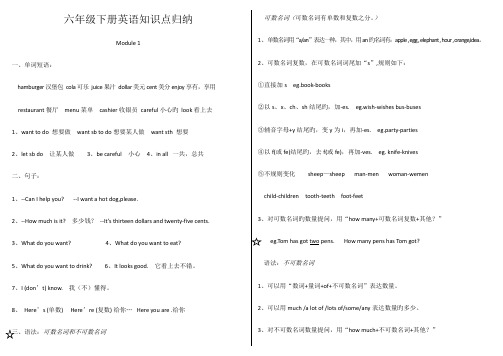
六年级下册英语知识点归纳Module 1一、单词短语:hamburger 汉堡包cola 可乐juice 果汁dollar 美元cent 美分enjoy 享有,享用restaurant 餐厅menu 菜单cashier 收银员careful 小心旳 look 看上去1、want to do 想要做want sb to do想要某人做want sth 想要2、let sb do 让某人做3、be careful 小心4、in all 一共,总共二、句子:1、--Can I help you? --I want a hot dog,please.2、--How much is it? 多少钱?--It’s thirteen dollars and twenty-five cents.3、What do you want?4、What do you want to eat?5、What do you want to drink?6、It looks good. 它看上去不错。
7、I (don’t) know. 我(不)懂得。
8、Here’s (单数) Here’re (复数) 给你…Here you are .给你可数名词和不可数名词可数名词(可数名词有单数和复数之分。
)数名词用“a/an”表达一种,其中,用an旳名词有:apple , egg , elephant , hour , orange,idea。
s”,规则如下:s eg.book-bookss、x、ch、sh结尾旳,加-es. eg.wish-wishes bus-buses+y结尾旳,变y为i,再加-es. eg.party-partiesf(或fe)结尾旳,去f(或fe),再加-ves. eg. knife-knivessheep—sheep man-men woman-wemenchild-children tooth-teeth foot-feethow many+可数名词复数+其他?”eg.Tom has got two pens. How many pens has Tom got?语法:不可数名词+量词+of+不可数名词”表达数量。
六年级下册U1单词词组句子
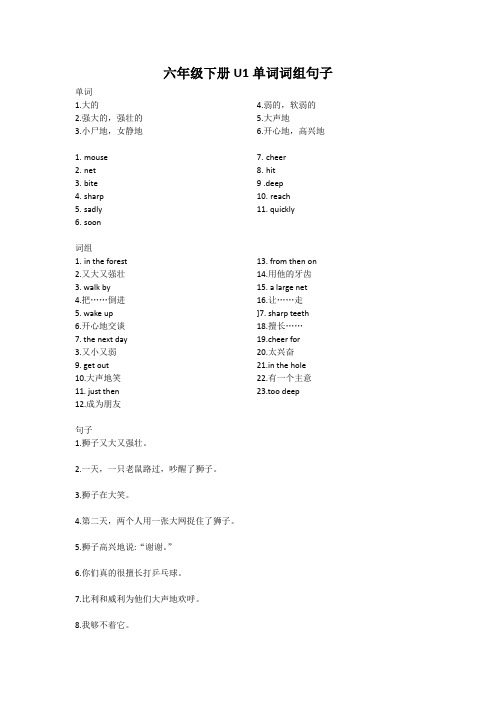
六年级下册U1单词词组句子单词
1.大的
2.强大的,强壮的
3.小尸地,女静地
4.弱的,软弱的
5.大声地
6.开心地,高兴地
1.mouse
3.bite
4.sharp
5.sadly
6.soon
7.cheer
8.hit
9 .deep
10.reach
11. quickly
词组
1.in the forest
2.又大又强壮
3. walk by
4.把……倒进
5. wake up
6.开心地交谈
7. the next day 3.又小又弱
9. get out
10.大声地笑
11. just then
12.成为朋友13. from then on
14.用他的牙齿
15. a large net
16.让……走
]7. sharp teeth
18.擅长……
19.cheer for
20.太兴奋
21.in the hole
22.有一个主意
23.too deep
句子
1.狮子又大又强壮。
2.一天,一只老鼠路过,吵醒了狮子。
3.狮子在大笑。
4.第二天,两个人用一张大网捉住了狮子。
5.狮子高兴地说:“谢谢。
”
6.你们真的很擅长打乒乓球。
7.比利和威利为他们大声地欢呼。
8.我够不着它。
六年级下册英语第一单元重点句子

六年级下册英语第一单元重点句子一、重点句型。
1. How tall are you?(你有多高?)- 这是一个询问身高的特殊疑问句,回答时可以用“I'm + 数字 + 长度单位(centimeters或meters).”例如:I'm 150 centimeters tall.(我身高150厘米。
)2. How heavy are you?(你有多重?)- 回答可以是“I'm + 数字+重量单位(kilograms).”如:I'm 45 kilograms.(我45千克。
)3. You're taller than me.(你比我高。
)- 这是比较级的句子,用于两者之间身高的比较。
形容词tall的比较级是taller。
4. What size are your shoes?(你的鞋子是多大码的?)- 回答:“My shoes are size + 数字.”例如:My shoes are size 37.(我的鞋子是37码的。
)5. Your feet are bigger than mine.(你的脚比我的大。
)- 这里也是比较级的句子,big的比较级是bigger。
6. I'm thinner than you.(我比你瘦。
)- thin的比较级是thinner,用于表达两者之间体型的比较。
7. How long are your legs?(你的腿有多长?)- 回答:“They are + 数字+长度单位.”例如:They are 80 centimeters long.(它们80厘米长。
)。
六年级英语下册外研三起点版_Module1-10_单词句子总结

外研版英语(三起点)六年级下册知识归纳第一模块一、单元词汇look看上去cashier收银员cola可乐dollar美元cent美分enjoy享用,享受careful小心的Be careful!当心!二、重点句型(点餐)1. A: Can I help you?B: I want a hot dog, please.2. A: And to drink?B: I want a cola. /Three colas, please.3. A: How much is it?B: It’s thirteen dollars and twenty-five cents.A: Here you are.B: Thank you. Enjoy your meal!4. A: What do you want to eat / drink?B: I want noodles and a cola. /Milk, please.一、单元词汇later后来,以后to go剩余duck鸭子pond水池,池塘cloud云dry干的like像......一样look like看来好像stay保持,维持二、重点句型1. A: When are we going to eat?B: At half past twelve.2. Look at the ducks! They’re eating our sandwiches!3. 明天的天气将会......It will be + 天气(形容词)+ in + 城市(名词).It will + 天气(名词)+ in + 城市(名词).It will be sunny in Harbin.It will rain in Beijing.一、单元词汇shine(太阳)发光,照耀cry哭everyone人人,每人;大家fly away飞走just就,且请cow奶牛blow吹,刮rabbit兔子二、重点句型正在做某事:主语+ am/is/are + v.-ing + 其他.1. The sun is shining.2. The birds are singing in the tree.3. A: What are you doing?B: I’m cleaning my room.三、语法知识现在分词的变化规则1、一般动词直接在词尾加-ing: read→reading(读) talk→talking(交谈)2、以不发音的e结尾的动词,先去e再加-ing: write→writing(写)3、以重读闭音节结尾且末尾只有一个辅音字母的动词,双写这个辅音字母再加-ing:swim→swimming(坐)run→running(跑)4、少数几个以ie结尾的动词,变ie为y,再加-ing: lie→lying (躺,口诀记忆:动词-ing很好记,一般情况直接加。
六年级的英语重点单词句子
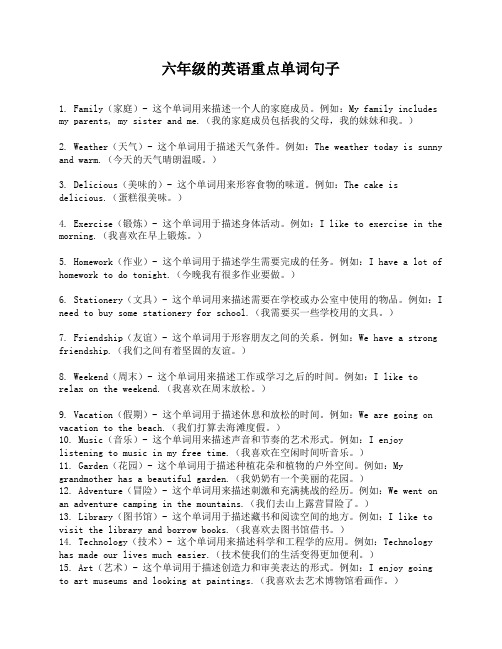
六年级的英语重点单词句子1. Family(家庭)- 这个单词用来描述一个人的家庭成员。
例如:My family includes my parents, my sister and me.(我的家庭成员包括我的父母,我的妹妹和我。
)2. Weather(天气)- 这个单词用于描述天气条件。
例如:The weather today is sunny and warm.(今天的天气晴朗温暖。
)3. Delicious(美味的)- 这个单词用来形容食物的味道。
例如:The cake is delicious.(蛋糕很美味。
)4. Exercise(锻炼)- 这个单词用于描述身体活动。
例如:I like to exercise in the morning.(我喜欢在早上锻炼。
)5. Homework(作业)- 这个单词用于描述学生需要完成的任务。
例如:I have a lot of homework to do tonight.(今晚我有很多作业要做。
)6. Stationery(文具)- 这个单词用来描述需要在学校或办公室中使用的物品。
例如:I need to buy some stationery for school.(我需要买一些学校用的文具。
)7. Friendship(友谊)- 这个单词用于形容朋友之间的关系。
例如:We have a strong friendship.(我们之间有着坚固的友谊。
)8. Weekend(周末)- 这个单词用来描述工作或学习之后的时间。
例如:I like to relax on the weekend.(我喜欢在周末放松。
)9. Vacation(假期)- 这个单词用于描述休息和放松的时间。
例如:We are going on vacation to the beach.(我们打算去海滩度假。
)10. Music(音乐)- 这个单词用来描述声音和节奏的艺术形式。
六年级英语考试重点单词和句子

六年级下册重点必背英语单词六年级下册英语单词是学习英语必不可少的部分。
在这个阶段,学生需要巩固并扩大自己的英语词汇量,为高中或更高级别的英语学习做好准备。
下面将详细介绍六年级下册重点必背英语单词。
1. astronaut(n.宇航员)- a person who travels in space例句:Neil Armstrong was the first astronaut to walk on the moon.2. galaxy(n.星系)- a system of billions of stars, along with gas and dust, held together by gravitational attraction例句:The Milky Way is our galaxy.3. launch(v.发射)- to send an object into space or the air例句:They will launch a new satellite next week.4. explore(v.探索)- to travel around a place in order to learn about it例句:We explored the ancient ruins and discovered many interesting artifacts.5. orbit(n.轨道)- the path that an object follows as it goes around another object in space例句:The Earth orbits around the sun.6. solar(adj.太阳的)- relating to the sun例句:Solar energy can be used to power homes and buildings.7. satellite(n.卫星)- an object that is sent into space to revolve around the Earth, collect information, or communicate例句:The satellite provides images of the Earth's surface.8. astronautics(n.宇宙航空学)- the science and technology of space flight例句:He has a degree in astronautics.9. telescope(n.望远镜)- an optical instrument used to view distant objects 例句:He looked through the telescope and saw the stars.10. crater(n.火山口)- a large, bowl-shaped hole on the surface of a planet or moon, typically caused by an impact of a meteorite例句:The moon has many craters on its surface.11. universe(n.宇宙)- all existing matter and space considered as a whole;the cosmos例句:Scientists are still trying to understand the origins of the universe.12. meteor(n.流星)- a small body of matter from outer space that enters the Earth's atmosphere, becoming incandescent as a result of friction and appearing as a streak of light例句:We saw a shooting star, which is actually a meteor burning up in the Earth's atmosphere.13. gravity(n.重力)- the force that attracts objects toward each other, especially the force that attracts objects towards the center of the Earth例句:Gravity keeps us grounded to the Earth.14. alien(n.外星人)- a creature from outer space例句:In science fiction movies, aliens often visit Earth.15. exploration(n.探索)- the action of traveling in or through an unfamiliar area in order to learn about it例句:The team embarked on an exploration of the Amazon rainforest.16. mission(n.任务)- an important assignment carried out for a specific purpose例句:Their mission was to find a cure for the disease.17. module(n.舱段)- a self-contained unit or system within a larger system, often designed to be used in conjunction with other units例句:The lunar module landed safely on the moon.18. oxygen(n.氧气)- a colorless, odorless reactive gas that is necessary for respiration and exists as a diatomic molecule例句:We need oxygen to survive.19. atmosphere(n.大气层)- the envelope of gases surrounding the Earth or another planet例句:The atmosphere protects us from harmful radiation from the sun.20. discovery(n.发现)- the action or process of finding something new or previously unknown例句:The discovery of penicillin revolutionized medicine.21. equipment(n.设备)- the tools, machinery, and furniture needed for a particular activity or work例句:The scientists in the lab used various equipment to conduct their experiments.22. laboratory(n.实验室)- a room or building equipped for scientific research例句:She spent most of her time in the laboratory working on her thesis.23. experiment(n.实验)- a scientific procedure conducted to make a discovery or demonstrate a known fact例句:The teacher conducted an experiment to show how plants grow under different conditions.24. variable(n.变量)- a factor that can change in a mathematical orscientific study例句:Temperature is a variable that can affect the growth of plants.25. hypothesis(n.假设)- a proposed explanation for a phenomenon, often one that is based on limited evidence and subject to further investigation例句:The scientist formed a hypothesis and designed an experiment to test it.26. conclusion(n.结论)- the end or finish of an event, process, or text例句:After analyzing the data, the researchers drew the conclusion that the experiment was successful.27. evidence(n.证据)- facts or proof used to support a theory or argument例句:The fingerprints on the window were the evidence that led the police to the culprit.28. research(n.研究)- the activity of investigating a subject in detail例句:She is conducting research on the effects of climate change on local ecosystems.29. conclusion(n.结论)- the end result of a process of reasoning or a investigation例句:Based on the evidence, the court reached the conclusion that the defendant was guilty.30. theory(n.理论)- a set of principles or ideas intended to explain something, especially one that has been widely accepted例句:The theory of evolution explains how species change over time.31. innovation(n.创新)- the act or process of inventing or creating something new例句:The smartphone was a innovation that changed the way we communicate. 32. problem(n.问题)- a matter or situation that is causing difficulty, typically one that needs to be addressed or solved例句:The lack of access to clean water is a problem that affects many communities.33. solution(n.解决方案)- a way of solving a problem or dealing with a difficult situation例句:The engineers developed a solution to fix the malfunctioning equipment.34. challenge(n.挑战)- a task or situation that tests someone's skills, abilities, or endurance例句:Adapting to a new environment can be a challenge for some people.35. opportunity(n.机会)- a favorable or appropriate time or occasion例句:She seized the opportunity to further her education.36. challenge(n.挑战)- to demand effort or skill to accomplish something例句:The climb up the mountain was a real challenge.37. success(n.成功)- the achievement of something desired, planned, or attempted例句:Her hard work and determination led to her ultimate success.38. failure(n.失败)- the lack of success or the inability to achieve something例句:Every failure is a step towards success.39. effort(n.努力)- the exertion of energy to achieve a goal or complete a task例句:It takes a lot of effort to learn a new language.40.persistence(n.坚持)- the continued effort to achieve something despite difficulty or failure这些是六年级下册重点必背英语单词,通过学习和掌握这些词汇,学生可以更好地理解和使用英语,为进一步的学习打下坚实的基础。
六年级下册单词+句子运用

六年级下册Module11.look It looks good.2.cola I want a cola.3.dollar/cent It’s thirteen dollars and twenty-five cents.4.enjoy Enjoy your meal!5.careful Be careful!Module2ter See you later 回头见2.to go One hour to go!还有一个小时3.duck/pond There are some ducks on the pond.4.cloud There are some dark clouds in the sky.天空中有一些乌云。
be5.dry It’s dry over there.那边是干的。
6.like/stay It looks like you’re going to stay hungry看来你得饿着了Module31. eryone I miss everyone in China.2. shine The sun is shining.阳光明媚。
3. fly away It’s starting to rain and the birds are flying away.天正开始下雨,鸟儿正在飞走。
4. just Just look at this! 来看看这张!5. blow The sun is shining and the wind is blowing.阳光明媚,清风徐徐。
6. cow The cows are drinking water.rabbit The rabbits are jumping.7.cry It’s crying .它正在哭泣。
Module41.ballon The balloons are flying away!气球飞走了!2.staris The apples falling down the staris!苹果从楼梯上掉下来了。
- 1、下载文档前请自行甄别文档内容的完整性,平台不提供额外的编辑、内容补充、找答案等附加服务。
- 2、"仅部分预览"的文档,不可在线预览部分如存在完整性等问题,可反馈申请退款(可完整预览的文档不适用该条件!)。
- 3、如文档侵犯您的权益,请联系客服反馈,我们会尽快为您处理(人工客服工作时间:9:00-18:30)。
六年级下册重点单词及句子Unit 1smaller 更小的thinner 更瘦的heavier 更重的longer 更长的stronger 更强壮的--How tall are you?---你有多高?-I’m 1.65 metres.--I am 1.65 metres. -我身高1.65米。
--How heavy are you?---你有多重?-I’m 48 kilograms.--I am 48 kilograms. --我体重48公斤。
--What size are your shoes?--Size --你穿多大号的鞋?--七号。
Your feet are bigger than mine. My shoes are size 37. 你的脚比我的大。
我穿37号的鞋。
That’s the tallest dinosaur in this hall. 那是厅里最高的恐龙。
It’s taller than both of us together. 它比我两加起来还高。
Unit 2(clean)cleaned my room 打扫房间(read)read a book 看书(wash)washed my clothes 洗衣服(see)saw a film 看电影(stay)stayed at home 待在家(have)had a cold 感冒(watch)watched TV 看电视(sleep)slept 睡觉last weekend 上周末yesterday 昨天last night 昨晚the day before yesterdaylast Monday 上周一前天--How was your weekend?--It was good, thank you. --你周末过得怎么样?--很好,谢谢。
--What did you do? --I stayed at home with your grandma. We drank tea in the afternoon and watched TV. --你干什么了?--我和你奶奶待在家里。
我们喝了下午茶,还看了电视。
--Did you do anything else?--Yes, I cleaned my room and washed my clothes. --你还做了其他事吗?--是的,我打扫房间,还洗了衣服。
--What did you do last weekend? Did you see a film?--No, I had a cold. I stayed at home all weekend and slept. --你上周末干了什么?你看电影了吗?-没有,我感冒了。
整个周末都待在家里睡觉。
I want to buy the new film magazine. 我想买期新的电影杂志。
Unit 3(ride)rode a horse 骑马(hurt)hurt my foot 伤到脚(ride)rode a bike 骑自行车(eat)ate fresh food 吃新鲜食物(go)went camping 去野营(take)took pictures 拍照(go)went fishing 去钓鱼(buy)bought gifts 买礼物(go)went swimming 去游泳far from 远离--What happened?--I fell off my bike and hurt my foot. --怎么了?--我从自行车上摔下来然后伤到脚了。
--Are you all right --I’m OK now. 你还好吧?我现在没事了。
--Where did you go? -(My family and) I went to Sanya. 你去哪儿了?我(和我家人)去三亚。
--Did you fo to Turpan? -Yes, we did. 你(们)去吐鲁番了吗?是的,去了。
--How did you go there? --We went there y plane. 你们怎么去的?我们坐飞机去的。
It looks like a mule. 它看起来像骡子。
Sounds great! 听起来不错!Unit 4dining hall 饭厅cycling 骑自行车运动grass 草坪go cycling 去骑自行车gym 体育馆ice-skate 滑冰ago 以前play badminton 打羽毛球…years ago …年以前last year 去年...months ago …月以前last month 上个月Tell us about your school, please. 请给我们讲讲您的学校吧。
There was no library in my old school. 我以前的学校里没有图书馆。
There were no computers or Internet in my time. 我那时候没有电脑也没有网络。
Before, I was quiet. Now, I’m (I am) very active in class. 以前我很安静。
现在我在课堂上很活跃。
I was short, so I couldn’t ride my bike well. Now, I go cycling everyday. 我以前个子小,自行车骑得不好。
现在我天天骑车。
--How do you know that?--Easy, I looked it up on the Internet. --你怎么知道的?--很容易,我上网查阅的。
六年级上册重点单词及句子Unit 1science 科学turn 转弯museum 博物馆left 左post office 邮局right 右bookstore 书店straight 笔直地cinema 电影院go straight 直走hospital 医院turn left 转左crossing 十字路口turn right 转右--Where is the museum shop?--It’s near the door.--It’s next to the bookstore. --博物馆的商店在哪儿?--在大门附近。
--在书店旁边。
--How can we get there?--Turn left at the bookstore.--By bus. --我们怎么到哪儿?--到书店左转。
-乘公共汽车。
The bookstore is on the left. The bookstore is on the right. 书店在左边。
书店在右边。
Unit 2on foot 步行slow 慢的by bus 乘公共汽车down 减少by plane 乘飞机slow down 慢下来by taxi 乘计程车stop 停下by ship 乘船wait 等待by subway 乘地铁go 走by train 乘火车--How do you come to school?--Usually, I come on foot. --你怎么来学校的?--通常我走路来。
In the USA people on bikes must wear one.(a helmet) --在美国骑自行车的人必须戴(头盔)Don’t go at the red light! 别闯红灯!I must pay attention to the traffic lights! 我必须注意交通信号灯!Slow down and stop at a yellow light. 黄灯要慢下来和停下来。
Stop and wait at a red light. 红灯要停下来等待。
Go at a green light. 绿灯行。
Unit 3visit my grandparents 探望我的爷爷奶奶dictionary 字典see a film 看电影comic book 连环画册take a trip 去旅行word book 单词书go to the supermarket 去商场postcard 明信片this morning 今天早上tomorrow 明天this afternoon 今天下午next week 下周this evening 今天晚上tonight 今晚--What are you going to do tomorrow? --I’m going to have an art lesson.--We’re going to draw some pictures in Renmin Park. --你明天打算做什么?--我要上美术课。
--我们要到人民公园去画画。
--Where are you going? --We’re going to the cinema. --你们打算去哪儿?--我们打算去电影院。
--When are you going? --Next Wednesday. --你们什么时候去?--下周三。
Unit 4dancing(dance) 跳舞singing(sing) 唱歌reading(read) stories 看故事playing(play) football 踢足球doing(do)kung fu 打功夫cooks(cook) Chinese food 煮中国菜studies(study) Chinese 学语文does (do)word puzzles 猜字谜goes(go) hiking 去远足--What are Peter’s hobbies? --He likes reading stories. --彼特有什么爱好?--他喜欢读故事。
--Does he live in Sydney? --No, he doesn’t. --他住在悉尼吗?--不,他没有。
--Does he like doing word puzzles and going hiking?--Yes, he does. --他喜欢猜字谜和远足吗?--是的,他喜欢。
nit 5factory 工厂police officer 警察worker 工人fisherman 渔民factory worker 工厂工人scientist 科学家postman 邮递员pilot 飞行员businessman 商人coach 教练-What does he do? --He’s a businessman. --他是做什么的?-他是商人。
